- Home
- Andrew McGahan
1988 Page 10
1988 Read online
Page 10
It was an experiment. It was a national park, which meant the usual restrictions on visitors concerning the treatment of flora and fauna. But the Gurig people themselves had full rights to pursue their traditional lifestyle. That included the hunting and harvesting of all animal and plant species in the park, native or introduced. They also controlled access. To the park in general, and in particular to any sites they considered sensitive or sacred.
The place was also a game reserve. The introduced species included feral pigs, buffalo, Timor ponies and banteng cattle. The banteng were particularly important. They were on the international big-game hunting lists, and Cobourg was one of the last places on earth that they were still plentiful in the wild. Thus many of the tourists were hunters. Apart from entry fees, they had to pay the Gurig people as safari guides, as well as paying bounties on anything they killed. Up to a thousand dollars a head. It was the park’s prime cash industry.
But that all happened over on the east side of the peninsula, forty or fifty ks away. Our side was off limits to tourism, without express permission from Allan Price.
I said, ‘We were told he wasn’t too keen on us coming.’
‘I wouldn’t know. I haven’t seen him for a few weeks. He doesn’t visit here all that often. They used to all live over here, years ago, back when the rest of the peninsula was out of their control. There’s a bunch of old shacks down in the bush. The government used your house as a school then. They had a white teacher who lived there, and she had maybe ten Aboriginal kids as students. It didn’t last long.’
He went off to the kitchen. Wayne and I sat. There was a classical piece on the stereo. From my brief inspection of Vince’s music collection, classical was all he possessed. He came out bearing plates. We sat down to eat. There was roast beef, thick gravy, roast potatoes, carrots and beans. We ate and drank while the orchestra played.
I nodded towards Vince’s desk, the typewriter and all the paper. ‘So what do you type?’
‘Letters.’
‘Who do you you write to?’
He shrugged. ‘The editor. The Conservation Commission. Friends down south. University libraries. My old lecturers. My son.’
‘You haven’t always been a ranger?’
‘No.’
It turned out Vince had worked in various jobs up until about thirty, then ended up at university. This was in Tasmania. He studied anthropology. He’d ventured into South Australia, working on Aboriginal languages. Then into the Northern Territory. He lost interest in the academic side, dropped out, and joined the Conservation Commission. Since then he’d worked in various national parks in the south of the Territory, and with various Aboriginal clans. He still communicated with the university though. I gathered he was something of an expert.
He’d also married while at university, and had a son. The wife, however, hadn’t shared his liking for desert life, and eventually they were divorced. And then, after ten years in the outback, he’d suddenly been sent to Cape Don. The Commission hadn’t asked or explained, they’d just ordered.
‘They’re bright boys there in administration,’ he said, ‘Everything I know is desert-related. And they send me here. Cape Don. A tropical and maritime park. Boats. Mangroves. Crocodiles. I know fuck-all about any of it.’
‘Can you get out?’
‘There’s only one thing I do know about Cape Don. Once your here, it’s very, very hard to get away again. You might wanna remember that over the next six months.’
‘We’ll be alright,’ Wayne said, ‘We’ve got things to do.’
‘You mean the writing and painting?’
‘Uh-huh. That’s the whole reason we’re here.’
Vince lit up a cigarette, pulled on his beer. ‘I met a lot of people who called themselves painters and writers, back in the desert. They were always breaking down, getting lost, annoying the shit out of everyone.’ He watched his cigarette smoke rise. ‘They said the same sort of thing.’
After dinner we dumped our plates in the sink, returned to the couches. Vince went back to his stool. He was on scotch and water now. I’d noticed a box of scotch in the kitchen, along with several bottles of port and cartons of beer. He drank steadily. His position on the stool was upright and stiff. Bitter, somehow. He played classical composer after classical composer, the volume increasing. Our attempts at conversation slowed. At ten to nine we all trooped out for the evening weather observation.
It was fully dark now, and the lighthouse was illuminated. It had twin beams, each pointing in opposite directions, and it revolved quickly. The air was so clear the beams were only faintly visible. Above the light were the stars, soft and slightly dimmed. There was no moon. Otherwise there were only the streetlights, a glow from the generator shed, and a great surround of darkness.
We watched Vince go through the readings. He had a torch for checking the thermometers in their box. It was 28.6 degrees. We discussed clouds. Possibly there was a very high, thin layer of cirrus up there. Vince decided there was, and put it at five-eighths. Inside the shack, the static on the radio had got worse, but at nine the call from Darwin came through, and Vince managed to make himself understood in return.
We went back to drinking and the music. Wayne and I were still on beer. Vince had switched to port. He sat on his stool with his eyes closed, swayed slightly, listening. The talk had stopped altogether. I stared at the ceiling, let the alcohol and the orchestra meet in my head. In the background was the zip and splutter of insects frying in the bug-zapper on the verandah. Finally Wayne and I looked at each other. It was time to go on home.
We thanked Vince for dinner. He nodded, not moving from his stool, his eyes closed. We made our way out, followed the white stones back towards our house. Strains of music followed us. Just on the fringe of the light, near our house, there were four wallabies, feeding on the grass. They were large and fat. At our approach they started and bounded off, back into the dark. I could hear them thumping through the scrub.
‘I think I’ll roll a joint,’ Wayne said.
We climbed up the front steps, switched on some lights. It was depressing. After the comfort of Vince’s house, our place looked filthy and bare. As welcoming as a train station. I could hear the buzz of the fluorescent tubes. Wayne went to his room to roll the joint, I settled on the back verandah. The darkness was more complete out there, away from the streetlights. There was only the pale beam of the lighthouse, sweeping overhead. And the stars, brighter now. I listened for the ocean. Still nothing. Maybe there was no surf at all in this part of the world.
Wayne brought the joint out and we smoked it, sitting on the safe ten-foot square, dangling our legs over the edge. Then we went to our rooms. On the way I peered out the front door. The wallabies were back, silently grazing. Something about them was sinister. Round, grey shapes, lumping their way across the grass. Maybe I was a little stoned. Homesick. Wallabies were utterly harmless.
I went into my great, empty bedroom. In the tropical night it managed to look cold. I threw some sheets on my single bed, imbibed various asthma drugs, climbed in. The mattress was lumpy, but bearable. I wrapped the sheet around me, grew hot. I threw the sheet off, felt the ceiling fan cool the sweat. I considered masturbating. It’d been six days, since Dalby. An unusually long time. All those shared rooms with Wayne. Somehow the desire wasn’t there. I lay, wide awake, listening to the fan, to the low pulse of the generator.
A screen door somewhere in the house banged softly. A breeze, not from the ceiling fan, stirred through the room. I thought about the schoolteacher who’d been posted here. I wondered which room she’d been in. This one? How had she felt, alone here every night, listening. I thought about ghosts in the hallway, about all the people who had lived here before me. Aboriginal kids, running up to school. Their parents, away in the scrub. The lighthouse-keepers and their wives and children. In this room, thirty, forty, seventy years ago, when the house was new and fine and beautiful.
All gone. I found I had an erection
. I used it, wiped it off with a handkerchief, and waited for sleep.
FOURTEEN
Next morning I tried out the shower. The tub was big and deep, but the water came out low-pressured and lukewarm. There’d be no joy there.
At twenty to nine we ventured over to the weather shack for our first official observation. Wayne had shown no desire to do it, so I was taking the first one. From there we’d alternate. Wayne would do the twelve, I’d do the three, Wayne the six, me the nine and so on. As there was no midnight observation it would be a two-day rotation. With at least a six-hour gap between readings, and nine every second night, hopefully sleep wouldn’t be a problem.
Vince was at the shack, red-eyed and ill, to supervise one last time. I set to with the field-book. It was an overcast morning, with low patches of dense grey cloud. We decided it was stratocumulus, type 5. I managed the encoding in good time, then dealt with the radio. Compared with Vince’s easy radio drawl I sounded nervous and awkward, tripping over all the numbers.
When I was finished Vince took over on the radio. He waited until a channel was clear, then put a call through to the Darwin operator. He wanted to place his order with the Nightcliff supermarket for the Friday deliveries.
‘It’s a little late,’ he told us, ‘Normally they like the order by Wednesday at the latest. Thought I’d wait though, see if there was anything you guys forgot to bring. Is there?’
We ordered a broom, a new scrubbing brush, and another carton of beer. When the call was finished we strolled out into the day.
‘So what are you gonna do?’ I asked Vince, ‘Now that you’re free.’
‘Sleep.’
He shuffled off, his black thongs slapping. Wayne and I moved back towards our house, wondering what to do with ourselves. Now that we had arrived and had settled and the job had started, we weren’t sure what came next. We ambled round the compound, checking out the details. There wasn’t much we hadn’t seen already. A water tank on a tower. And old plough, half-buried in the dirt. A collection of fuel drums. More small sheds. One of them was a garage for a second four-wheel drive. Its hood was up and parts of the engine missing. There were spider webs in the cabin.
In another shed we found machinery, drums, netting, a smashed wardrobe, broken furniture in general. We dug around and came across some old kitchen chairs, three of them. We took them back to our house, arranged them around the small table in the dining room. Seating. Even so, the room still looked absurdly empty. It was a big space, stretching from one side of the house to the other, with wide double doors at either end, opening onto the verandah.
It had also been, as Vince said, a schoolroom. At one end, tacked on the wall, were three cardboard cut-out clocks. They were flyblown and curled and very old. The first of them was red and set at eight o’clock. The second was orange and set at midday. The last was green and set at four. The first had the words ‘We start school at—’ written on it. The second said ‘We have lunch at—’. The third, ‘We go home at—.’ Eight till four, then. They had a long school day.
At the other end of the room were some lines painted on the wall, under writing that said ‘How high am I?’ Next to the lines were names. Nola. Dulcie. Judith. Enid. Veronica. Trenton. Robert. And Daniel. Eight students. The highest was no more than four feet, and each name appeared only once. Maybe the school had only lasted one year.
There was only one thing left to do.
‘The lighthouse?’ I said to Wayne.
‘The lighthouse.’
We went out. There it was, brown against the grey sky. It still looked ugly. Near the base were several tilted panels—solar cells. They fed into a small shed which was fenced off and securely locked. No doubt it held the batteries for the light. The door to the lighthouse itself was bolted, but there was no padlock on the bolt. We slipped it back, opened the iron door, and went inside.
More disillusionment. The steps weren’t spiral. They went back and forth like ordinary stairs. The room at the base was cramped and contained nothing but some boxes and a large coil of rope. We climbed up. I didn’t count the stairs. At the top was another iron door, about half normal size. We opened it and climbed through. We were on a balcony that circled the tower. A few feet above us was another, smaller balcony that circled the actual light. A ladder led up to it. We didn’t bother. We were high enough.
We looked out. Waited. Looked out some more. Somehow it wasn’t satisfying. The ocean was there, but it seemed empty and flat. The coastline too was featureless, receding in either direction, endless mangrove and reefs. Otherwise there was only the bush, stretching away into the low hills. There was nothing for the eye to fix on, nothing that gave any real sense of perspective or place. And why else did you climb things, if not for perspective?
We climbed down. It was hot and we were sweating. The day waited to be filled.
We set about arranging the house for our private pursuits. My prime concern was a desk. There was nothing suitable anywhere. I dug through the junk shed again and found two more chairs with missing seats. I took them to my room, along with one of the doors from the broken wardrobe. I set the chairs about four feet apart, then lay the door across the backrests. The door had a full-length mirror on it, so I had the mirror facing upwards as the writing surface. I unpacked all the paper and ink and pens, arranged them on the desk. I sat down to test the feel of it, leaned on my elbows, stared at my reflection. Ten or twenty seconds passed. A mirror? For writing? Jesus.
I got up and found Wayne. He was making his choice about a studio. There were only the two spare bedrooms available—the one with all the old beds, and the one which was the chemical dump. The former was by far the bigger of the two, but also the darkest. The chemical dump, Wayne claimed, had the superior light.
So we began rearranging the bottles and cans, moving some of them in with the old beds. In the end we’d cleared half the room, which gave Wayne space enough for his two easels. We also uncovered a workbench on which he arranged his equipment. We stood admiring it all for a minute. It looked no more like a studio than my wardrobe door looked like a desk. Nor did it seem any more likely that Wayne was about to start painting than I was about to start writing.
Midday came along and with it Wayne’s first observation. I tagged along for moral support. Wayne muddled his way through. The clouds were still low and heavy, the temperature an even 32 degrees, the wind very slight from the north-east. When it came to the radio, Wayne sounded even worse than I did. He got the call sign wrong, forgot to say ‘Over’, or to repeat each sequence of numbers. The operator sighed over the air and corrected him. Finally he was finished.
Outside again we were met by Kevin. He didn’t bother barking. He panted at us. The heat and the humidity must have been lethal for him. It wasn’t the place for a longhaired dog. Wayne squatted down and scratched his head.
‘Hello Kevin,’ he said.
We headed back towards the house. Kevin followed, trotting along the path. I assumed that Vince must still be asleep. The dog was in search of company. We sat on the front steps. Kevin dumped himself between Wayne’s legs. It was obvious who he liked out of the two of us. Wayne kept scratching him. It was mutual.
‘Look at all these ticks,’ said Wayne, ‘He’s crawling with them.’ He was digging around in Kevin’s hair. I looked. There were fat black ticks all along the dog’s spine. Dozens. Wayne tugged at them with his fingers. One came out. It squirmed between his fingers, pincers clutching. It was huge. Wayne put it on the step, crushed it with his thumb. The tick burst. Blood oozed onto the wood.
Wayne held Kevin down, got started on the others.
After my three o’clock observation we put two chairs on the back verandah and sat there. We opened some beer. Stared out. Bush. Ocean. Low clouds. Out to sea there even appeared to be rain. Precipitation. We talked about dinner.
‘Can you cook?’ I asked Wayne.
‘Nothing special. What about you?’
‘Spaghetti. Steak and chips.’
/>
‘Right.’
‘You have lived away from home before haven’t you?’
‘Sure. I’m not big on cooking though.’
‘I suppose I could make steak and chips then, tonight.’
‘Fine with me.’
‘Whoever doesn’t cook has to wash-up.’
‘You don’t really think we’re gonna wash-up every night?’
‘No.’
We sipped on our beers.
‘Did you notice a washing machine over at Vince’s place?’ Wayne asked after a while.
I thought. ‘No, I didn’t.’
It was suddenly very quiet. It took me a moment to notice what it was—the generator had stopped. And with it all the ceiling fans in the house. The silence was dense. Then there was the soft swish of wind in the trees. Bird calls. A moment later the generator started up again. The ceiling fans followed. The sounds of nature faded away.
We drank, stared out. Towards dusk the air began to fill with small, black sandflies. They were swarming up from the mangroves down below. Hordes of them. We’d noticed this the previous evening, but inside, under the ceiling fans, they hadn’t been so bad. Now they were unbearable. We slapped and scratched, then brought out the insect repellent. I slathered it over my legs, arms and face. Tropical strength. It seemed to work.
We went on sitting.
Wayne had the six o’clock observation, so at five-forty he headed off alone. I began work on the dinner. Steak and chips and peas. I went through our implements. One battered frypan, three pots. The gifts of my mother. It seemed sufficient. All I needed now was music.
I went to my room, got my stereo. It was smaller and older than Wayne’s, but it functioned. I set it up and switched it on. The radio dial was mostly static except for one ABC station that was reading market prices. It sounded distant and irrelevant. I made a decision not to listen to the radio for the next six months. I’d ignore the world. No news broadcasts, no newspapers either. If we were supposed to be isolated, then we may as well be serious about it. It seemed a good decision. I found a tape, slotted it in, switched it on.

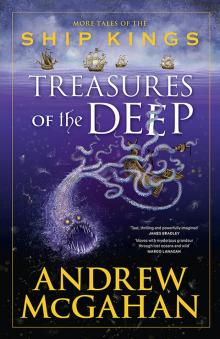 Treasures of the Deep
Treasures of the Deep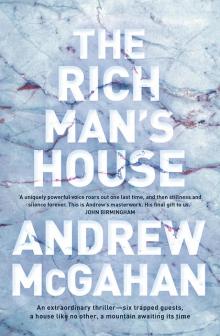 The Rich Man’s House
The Rich Man’s House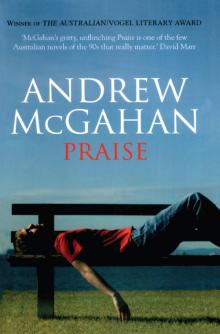 Praise
Praise The White Earth
The White Earth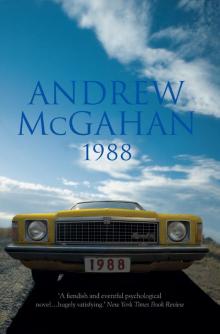 1988
1988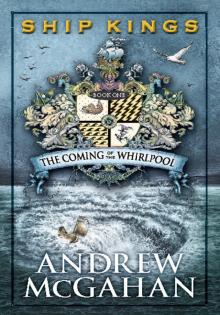 The Coming of the Whirlpool
The Coming of the Whirlpool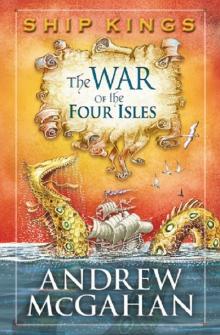 The War of the Four Isles
The War of the Four Isles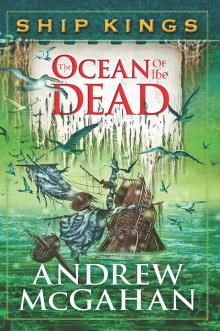 The Ocean of the Dead: Ship Kings 4
The Ocean of the Dead: Ship Kings 4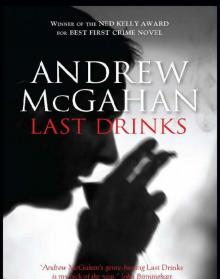 Last Drinks
Last Drinks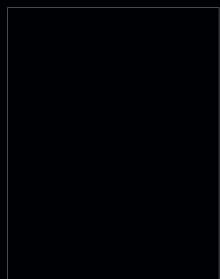 Wonders of a Godless World
Wonders of a Godless World Underground
Underground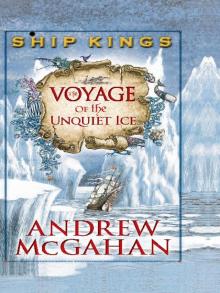 The Voyage of the Unquiet Ice
The Voyage of the Unquiet Ice